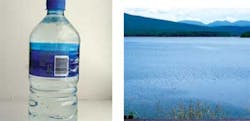What do your customers think of you? 10 Questions for Water Utilities
By Matthew Frank
Most Americans don’t think much about where their water comes from. So, it’s understandable that when water utilities need to undertake projects, they often have trouble convincing their customers to pay for them.
If this sounds familiar, you may wish that your community were better informed or more engaged. Here are 10 questions you can ask yourself about your utility to prepare for building a better relationship with your community.
Customers’ First Impressions
1) When you say “water utility,” which do your customers think of first?
A good sign of community support is that your customers think first about water treatment plants and the services you provide to them, and only secondarily about their monthly bill.
2) When you say “clean water,” which do your customers think of first?
If clean water makes your customers reach for bottled water, they may not realize the quality of the water from their tap; however, if they think of their water system’s reservoirs, then they have a real connection with their water utility.
Engaging Your Customers
3) Which people from the water utility have your customers met?
If they’ve only met the people who read their meters, they may think of water mostly as a cost. Games and information booths at public events can be a great way for customers to meet the executives and engineers who ensure they get clean water.
4) Have your customers seen where their water comes from?
Consider providing tours of your treatment plants or your reservoirs to allow your customers to feel the same pride in your facilities that you do.
5) Do your customers understand the mail they receive from you?
No one wants to pay a confusing bill. Likewise, detailed information about water quality may worry your customers rather than reassure them. A clearly designed bill, or a simple water testing kit, can make the mail more engaging and more informative.
Making Your Information Accessible
6) How many visitors to your website look at one page and then leave?
If your home page is cluttered with too much information or too many graphics, it may turn visitors away. Simplifying the first page may make it easier for your customers to click through to the next one. And, if your community has many Hispanic residents, consider also offering your website in Spanish.
7) Can your customers visualize the threats to their water supply?
If your customers can see graphs of sinking water tables, they may be more motivated to conserve groundwater. If they can see a diagram of good landscaping practices, they may be more motivated to preserve their surface water with responsible development.
8) How do people in your community find out what to do with used batteries, old paint, or industrial chemicals?
Diagrams and maps can help people understand proper waste disposal. If people who come into contact with these materials speak languages other than English, they will appreciate the ability to access the instructions in their own languages.
Explaining Your Finances
9) Can your customers or their elected officials identify the biggest uses of water fees?
They may see the value of their dollars more clearly if you provide graphs that explain most of the budget, or — better yet — meet with them to explain it. A clean water supply probably costs your customers less than any of their other utilities.
10) Have your customers seen what happens when cities underinvest in water infrastructure?
Stories of flooding from water mains, of fines for untreated wastewater, or of citizens needing to boil water to deal with impurities, are all too common. These stories may help to point out the value that we all get from greater investment in water infrastructure.
Fostering a strong relationship with your community can bring many benefits. When your customers understand your water utility’s functions, they will be more aware of water in their lives — and this lays the groundwork for community support and involvement on future initiatives. Use these questions as a diagnostic guide to connecting with your community, and always be on the lookout for steps you can take to improve this important relationship.
About the Author
Matthew Frank is the founder of Aqueous Advisors, which provides public relations for water utilities. He can be contacted at 646-688-5256, or at [email protected].


